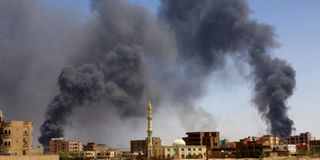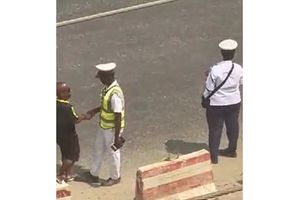How Africa’s armed conflicts fuel ‘disappearance’ of people

A man walks as smoke rises over buildings following air strikes during clashes between the paramilitary Rapid Support Forces and the Sudanese army in Khartoum North on May 1, 2023. PHOTO | REUTERS
What you need to know:
New data shows more than 71,000 people, 25,000 children among them, have been reported missing on the African continent by the end of June, 2024, according to details contained in a report by the International Committee of the Red Cross (ICRC).
Africa’s enduring conflicts like that of Sudan are helping disappear more people than before, sending unending trauma to families left behind.
New data shows more than 71,000 people, 25,000 children among them, have been reported missing on the African continent by the end of June, 2024, according to details contained in a report by the International Committee of the Red Cross (ICRC).
Women and children account for more than half (54 percent) of the ICRC’s missing cases in Africa.
The missing persons are those whose fate is unknown, usually after an incident like war, abduction, kidnapping, natural disaster or accident. And the ICRC usually tried to reconnect families torn apart by such incidents.
In this year’s cases, ICRC says the number of missing persons is mainly due to the increased armed conflicts on the African continent, forcing many to leave their homes or end up as victims of the war in some other way.
The data, released every year on August 30th when the world observes the International Day of the Victims of Enforced Disappearances, highlights the grave injustices faced by countless individuals and their families around the world and calls for action to prevent such atrocities in the future.
Established by the UN General Assembly in 2010, the day aims to draw attention to the fate of individuals who have been forcibly disappeared, often by state officials or with state complicity.
“The ICRC is working on more than 71,000 (71,244) cases of missing persons in the first half of 2024. Thirty-six percent of these cases are of children (25,370), 37 percent of these cases are women or girls (26,603), 54 percent of these cases are women and minors (38,823),” said Susana Lopez, protection of family links regional manager, ICRC.
“Missing of persons is one of the most underestimated humanitarian challenges or problems we face in the African continent where families who have missing loved ones are in desperate need of having more collective national, international, transnational and global response and to prevent this from happening.”
The increased number of armed conflicts in Africa has seen many people going missing or dying and remaining unidentified.
In Sudan conflict, at least 18,000 people have died since the Sudan Armed Forces clashed with the paramilitary Rapid Support Forces (RSF) from April last year.
And although nearly 11 million people are internally displaced in Sudan, the data has not captured those missing are they are wont to be categorised as dead or displaced.
Sudan is not unique though. Since the beginning of the 2000s, the number of armed conflicts in Africa has doubled, from around 20 to more than 40, forcing the African Union to delay its vision of ‘silencing the guns’ by 10 years to 2030.
The ICRC also estimates that in Africa around 83 million people live in areas entirely or partially controlled by armed groups.
Nigeria recorded the highest number of missing persons in 2024, at 24,019 cases in Africa followed by Somalia at 9,584.
“Mozambique had 6,279, Sudan 6,224, South Sudan 5,903 and Ethiopia 5,499 cases, are the contexts in Africa with largest numbers of missing cases recorded by the family links network,” said Lopez told The EastAfrican.
Over 25,000 separated and unaccompanied children registered in Africa, notably in DRC-2,677, Uganda-1,155, Ethiopia-901, Nigeria-592 and Rwanda-434.
“It is the state authorities that have the primary responsibility to clarify the fate and the whereabouts of the missing persons,” said Lopez.
“So here the political will is crucial and fundamental step to be able to curb with all the resources needed to address the problem, whether they are human resources, financial, legal, operational, technical, scientific and administrative and genuine political will to ensure that we have the cooperation within the authorities in a given country but also international because this goes beyond the African continent.”
In Democratic Republic Congo, following the escalation of hostilities in January 2024, more people were displaced, creating a crisis from among those who had already lost homes in earlier wars.
Volunteers from the DRC Red Cross have been working in telephone booths set up by the ICRC to offer free service to the many displaced people who have lost contact with their families.
Between 20 February to 30 May 2024, 55,512 free calls were made from these phone booths; 128 children separated from their loved ones due to the crisis have been registered, and 20 of them have been reunited with their families.
Globally, the Red Cross reports that, every minute, it helps 4 families separated by conflict, violence, migration, and disasters call each other. Every hour, it helps clarify the fate and whereabouts of 2 missing persons. Every day, the ICRC facilitates the reunification of 21 people with their families.
In 2023, more than 65,800 people were registered as missing by their families with the Family Links Network, bringing the current number of registered missing people to more than 239,700, IICRC says.
Enforced disappearances are actually occurring all over the world, including Kenya, Uganda and Tanzania which are relatively peaceful, affecting individuals of every age and profession. In such areas, the enforced disappearance is often by secret squads of police or some armed government agency.
Rights watchdogs and Kenya’s Western allies including the US recently raised this issue with authorities.
In Tanzania, opposition groups last week demanded an independent probe into activists said to have vanished recently. The opposition blame the police.
The Kenya National Commission on Human Rights (KNCHR) and the Law Society of Kenya have reported a total of over 34 cases of abductions and enforced disappearances by August 2024.
The abduction increased during the GenZs led protests against the Finance Act 2024 in June prompting the civil society groups to move to court.
This practice violates many human rights that are enshrined in Kenya’s new constitution, international law, including the right to liberty and security of person, the right to a fair trial, and the right to family life.
“If there was ever a time for civil societies to unite, it’s now. We must work together for the people of Kenya. The Constitution is for everyone, not for any tribe or class,” said Faith Odhiambo, LSK president, during the commemoration of Kenya's 2010 constitution “Katiba Day’ held on 27th August this year in Nairobi.
Overall, political activists, human rights defenders and journalists and ordinary people have all been victims of enforced disappearances across the continent.
“Impunity compounds the suffering and anguish. Under international human rights law, families and societies have a right to know the truth about what happened. I call on Member States to fulfil this responsibility,” said António Guterres, the UN Secretary General in a statement.
This tragedy can be prevented, and every effort needs to be made to prevent even one person from going missing.
International humanitarian law (IHL) and international human rights law (IHRL) contain obligations relevant to preventing people from going missing and it is key to ensure proper and effective domestic implementation of these.



